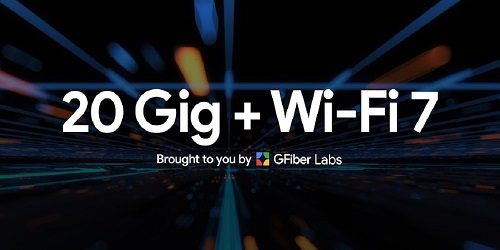Google is officially beginning to roll out a 20Gbps internet service though the company’s GFiber Labs that comes with a pre-certification Wi-Fi 7 router that comes at a premium, as the service will cost $250 a month.
Google is starting this premium internet service in Kansas City, North Carolina’s Triangle Region, Arizona and Iowa, but the company is rolling out Nolia’s 25G PON across its network, so new areas will be added. Installations are expected to begin in the first quarter of 2024.
This new plan is the fifth plan in the GFiber offerings, which also include an 8-gig plan for $150 a month, a 5-gig plan for $125 a month, a 2-gig plan for $100 a month, and a 1-gig plan for $70 a month.
GFiber internet is not yet available in many places, as Google is currently offering or announced those services in cities in just 18 states, excluding all of the Northeast but including several lager cities like San Diego and San Francisco, Chicago, Miami, Denver, Atlanta and Seattle.
“As we enter the new year, expect more news out of GFiber Labs — speed is the first step towards next generation internet,” writes Nick Saporito, head of product at GFiber Labs, in a blog. “We’re working to redefine internet customer experience and to bring it to more people in more places, and GFiber Labs is focusing on how we go from incremental to exponential improvement when it comes to what your internet can do.”
The company is also still rolling out its lower packages to new areas, and this week also announced that its 8-gig plan was available in Utah, North Carolina’s Triangle region, and Austin, Texas. The company began rolling out that plan along with a 5-gig plan earlier this year.
Now, 75% of the company’s residential customers can get at least 5-gig.
Plans include the option of a Nest Wifi pro or a Wi-Fi 6 router, and the 2-gig plan and up include at least one mesh extender.







